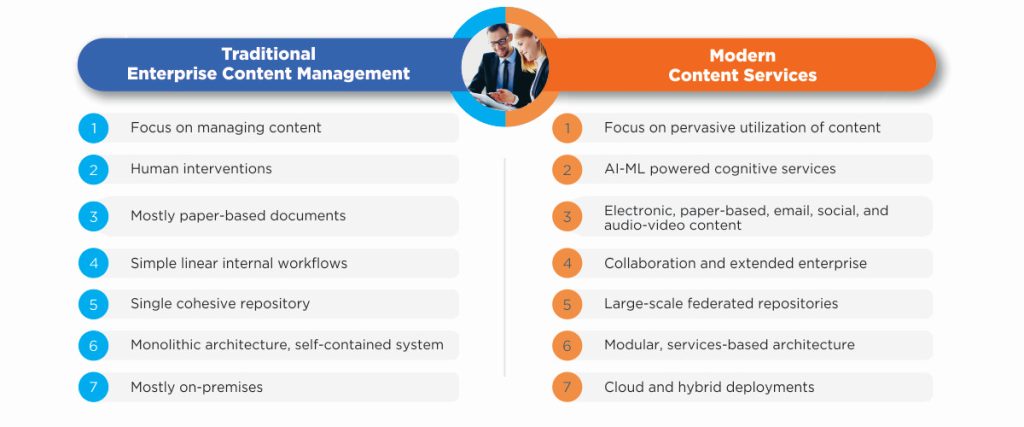
Leverage Newgen’s contextual content services platform for your enterprise content management needs
What is Enterprise Content Management?
Enterprise Content Management (ECM) is an all-encompassing term that defines a set of processes and strategies used to capture, manage, and deliver content. Rather than a single technology or procedure, ECM utilizes a combination of methods to support critical information management. This information can then be distributed to employees, stakeholders, and customers.
Enterprise Content Management software has evolved over the years as new and innovative forms of content are introduced to professional work environments and continues to be a critical function to support business practices.
In traditional ECM software, the definition of content generally refers to any information printed on paper documents such as invoices, spreadsheets, or reports. However, that definition has expanded to include any digital information such as email messages, audio and video files, social media posts, web content, and more.
When working with large volumes of content, it is essential to implement an ECM solution to streamline content distribution with workflow automation routing to achieve the full benefits of the platform. With functionalities ranging from capturing content from multiple sources, managing it in a secure, centralized repository, and making information and file-sharing accessible across content-centric processes, Newgen enables business leaders to build a boundaryless workplace with anytime-anywhere content access.
How does ECM Software work?
Enterprise Content Management describes the approach organizations take in managing the end-to-end lifecycle of their content, from origination to disposition, while providing the flexibility to access and deliver digital content across all channels and devices.
Business leaders must create a connected and digital workplace to empower their employees with contextual information and easy access to content, thereby driving more informed interactions with customers, partners, and stakeholders.
End-users can search for specific content within large volumes of structured and unstructured information using full-text natural requests. An ECM system will retrieve it instantly regardless of their device or location. From there, the user may edit, print, read or reformat the content as needed. Enterprise Content Management systems also automate document capture, decreasing the time spent manually scanning and reformatting content.
Capture
Acquires and delivers data into digital form to help automate data entry tasks and reduce human error
Manage
Directs and connects data through collaboration and workflow tools to simplify indexing, retention, and purging.
Store
Stows and categorizes data using a repository, a library tool, and the hardware (servers, cloud-storage, or optical disks.)
Preserve
Data is backed up and sustained for long-term usage
Deliver
Approved users are provided with the data they need when they need it
Request a Demo
What Are Some Use Cases of ECM?
Newgen’s Enterprise Content Management solutions have positively impacted organizations in many industries. A few use cases include:
Human Resources
ECM has obvious benefits in the world of HR. Digital documents are far more easily distributed, tracked, and stored than paper documents. Automated workflows significantly speed up handling everyday business functions related to employee case management. And, of course, the digital transformation of your HR department allows for more robust audit trails.
Banking
Documents for various processes like account opening, loan processing, credit card processing, RTGS, and insurance policy can be archived and managed by Newgen’s ECM suite. This enables streamlined processes between bank branches and the corporate office, ensures the desired economy of scale, increased operational efficiency, and efficient management of document images.
Governmental Records Management
Governments must comply with regulations for archiving and sharing documents securely. A modern ECM enables cost-effective, long-term storage of all types of records, easy tracking of the physical movement of documents and physical records, and compliance with the regulatory requirements to prevent accidental deletion of documents, minimizing risk and enhancing accountability.
How has ECM Evolved?

Which ECM System Is Right for My Organization?
There is a wide range of business process management and document management capabilities in today’s platforms. Choosing the right solution for your business involves understanding how content is currently used throughout your enterprise and how automated workflows and process engineering should work to improve the use of content.
According to TechTarget, basic elements of ECM software should incorporate the following:
- content lifecycle management
- workflow management
- information governance
- content management systems
- collaboration tools
- enterprise document management
- digital asset management
When it comes to more complex ECM, the software will feature:
- Multi-channel content management for digital customers
- Analytics for contextual customer interaction
- 100% accurate content capture for faster turnaround time
- Speedy capture, storage, and access of voluminous content
- Automated operational workflows to serve customers better
- Robotic process automation for lightspeed tasks execution
- Fast deploying, upgrading, and recovering functionalities
- Extensibility with content services integration/aggregation
